Every two years the
Santa Clara County Council, Boy Scouts of America,
sponsors an International Rendezvous, with Scouts from many foreign
lands joining our own Scouts for a week of camping and events.
 The flags of 11 nations flutter in the breeze as our International Scouts
pull into camp for a week in the High Sierra. They've already had a
day in the Santa Clara Valley ("Silicon Valley") with our own local
Scouts, to get acquainted, take swim tests, and eat some American food.
The flags of 11 nations flutter in the breeze as our International Scouts
pull into camp for a week in the High Sierra. They've already had a
day in the Santa Clara Valley ("Silicon Valley") with our own local
Scouts, to get acquainted, take swim tests, and eat some American food.
 The bright blue jerseys told you that the Ireland contingent was in the area! They
were great talkers on our 40-meter station, wow-ing the OMs around the western United
States with their great English accent and wealth of questions.
The bright blue jerseys told you that the Ireland contingent was in the area! They
were great talkers on our 40-meter station, wow-ing the OMs around the western United
States with their great English accent and wealth of questions.
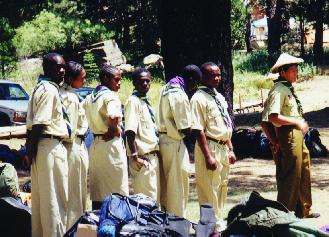 With their camping gear lying all over the Flag Meadow, the international
contingents gathered for our first ceremony. Here the Tanzanians talk
among themselves, and the distinctive straw hats of the Philippino crew
were a real "collector's item" for our local Scouts.
With their camping gear lying all over the Flag Meadow, the international
contingents gathered for our first ceremony. Here the Tanzanians talk
among themselves, and the distinctive straw hats of the Philippino crew
were a real "collector's item" for our local Scouts.
 The young men and women from Nigeria were enthusiastic and enterprising; you'll see
lots more of them in the photos below at our Radio Station!
The young men and women from Nigeria were enthusiastic and enterprising; you'll see
lots more of them in the photos below at our Radio Station!
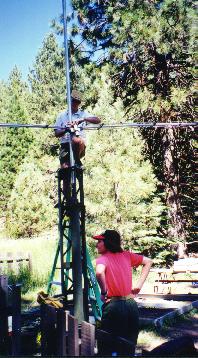 Paul KM6LH balances on the base of the tower (also using a ladder) to attach the
two-element tribander (thanks, W6SKI!) to the mast section. This army-surplus
tower has eight 5-foot sections of large-diameter tube, which are clamped in
place and then cranked up (on an elevator). As each is raised about 6', the
elevator is lowered and another section is attached.
Paul KM6LH balances on the base of the tower (also using a ladder) to attach the
two-element tribander (thanks, W6SKI!) to the mast section. This army-surplus
tower has eight 5-foot sections of large-diameter tube, which are clamped in
place and then cranked up (on an elevator). As each is raised about 6', the
elevator is lowered and another section is attached.
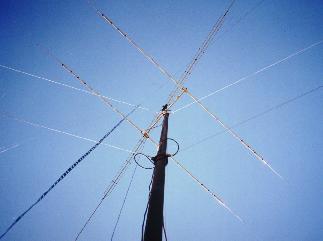 There's NOTHING finer than a bunch of aluminum high in the air! The two-element
tribander sits below the rotatable 40-meter dipole (thanks, N6XI!) in quadrature. Two
sets of the guy wires gleam in the Sierra sunshine, and a light line on a pulley was
added to raise the 80-meter dipole -- an HF operator's dream.
There's NOTHING finer than a bunch of aluminum high in the air! The two-element
tribander sits below the rotatable 40-meter dipole (thanks, N6XI!) in quadrature. Two
sets of the guy wires gleam in the Sierra sunshine, and a light line on a pulley was
added to raise the 80-meter dipole -- an HF operator's dream.
KM6LH was granted an Indian name when he became a Chief in the Tribe of Camp Hi-Sierra --
it is "Waves in the Wind", and rumor has it that this refers to radio waves.
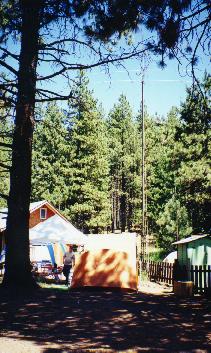 Let's take a tour of the K6BSA operation. On the right is the archery range's green
shed. Then you see our tower (inside the picket fence, to keep it out of traffic). Our
20-meter station is next (the brown tent), with the 40-meter one unseen behind it.
With the hot July days at our mile-high elevation, the self-supporting
white and blue awnings were wonderful for the
Scouts to 'crash' under! The Mountain Bike Barn shows its form on the left.
Let's take a tour of the K6BSA operation. On the right is the archery range's green
shed. Then you see our tower (inside the picket fence, to keep it out of traffic). Our
20-meter station is next (the brown tent), with the 40-meter one unseen behind it.
With the hot July days at our mile-high elevation, the self-supporting
white and blue awnings were wonderful for the
Scouts to 'crash' under! The Mountain Bike Barn shows its form on the left.
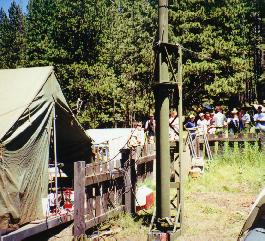 Here's a better look at the olive-drab of the tower base (and the olive-drab of the
40-meter station tent). You can see one of the Patrols in the background, beyond
the fence, waiting to come in and see how all this gear works to throw our voices
across the oceans.
Here's a better look at the olive-drab of the tower base (and the olive-drab of the
40-meter station tent). You can see one of the Patrols in the background, beyond
the fence, waiting to come in and see how all this gear works to throw our voices
across the oceans.
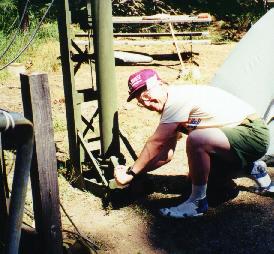 Sure, it's nice to have a fancy motor-driven rotator -- but the old ways still work!
Here KM6LH brings the 20-meter antenna to a bearing on Europe. (Thanks, Yaesu, for
all the caps; they were collectors-items among the Scouts.)
Sure, it's nice to have a fancy motor-driven rotator -- but the old ways still work!
Here KM6LH brings the 20-meter antenna to a bearing on Europe. (Thanks, Yaesu, for
all the caps; they were collectors-items among the Scouts.)
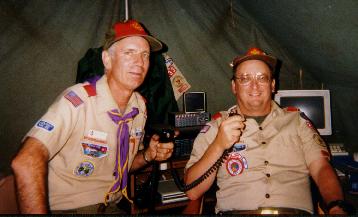 Paul Wesling KM6LH (left) ran the 40-meter station, and Al Rusnak KE6JAC (right) sits
in front of his 10-15-20 station. It's amazing how crowded a two-man tent
gets when you stuff in a table, radio, logging computer, and a few chairs
for guests!
Paul Wesling KM6LH (left) ran the 40-meter station, and Al Rusnak KE6JAC (right) sits
in front of his 10-15-20 station. It's amazing how crowded a two-man tent
gets when you stuff in a table, radio, logging computer, and a few chairs
for guests!
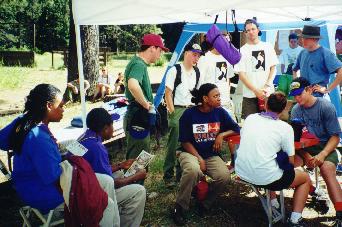 The encampment was broken down into about a dozen Patrols, each with about 5 international
Scouts and 5 local Scouts. Each Patrol would schedule an hour at the K6BSA radio shack
(er, tents), and we'd discuss how amateurs around the world get licenses and
talk to each other. The Nigerian girl on the left holds the Station's custom QSL
card, as a souvenir.
The encampment was broken down into about a dozen Patrols, each with about 5 international
Scouts and 5 local Scouts. Each Patrol would schedule an hour at the K6BSA radio shack
(er, tents), and we'd discuss how amateurs around the world get licenses and
talk to each other. The Nigerian girl on the left holds the Station's custom QSL
card, as a souvenir.
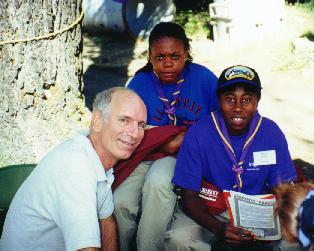 The ARRL's "Archie" comic books proved a hit with the teenagers. Here Paul
talks to two of the loquatious Nigerian young women.
The ARRL's "Archie" comic books proved a hit with the teenagers. Here Paul
talks to two of the loquatious Nigerian young women.
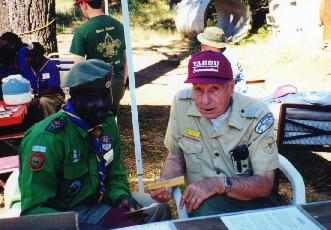 Ed Sheldon (no longer a ham) was an invaluable and patient part of the K6BSA team,
showing old gear and tubes, demonstrating the sound of Morse code, and expaining
how to get a license. A jug of icewater is in view on the table behind Ed, to
make the hot Sierra day a bit more bearable for the visiting Scouts.
Ed Sheldon (no longer a ham) was an invaluable and patient part of the K6BSA team,
showing old gear and tubes, demonstrating the sound of Morse code, and expaining
how to get a license. A jug of icewater is in view on the table behind Ed, to
make the hot Sierra day a bit more bearable for the visiting Scouts.
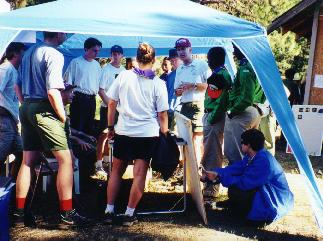 KM6LH (standing, right) explains about long-distance propagation while a
young visitor pushes a pin into the US Map to log another "contact".
KM6LH (standing, right) explains about long-distance propagation while a
young visitor pushes a pin into the US Map to log another "contact".
 A 10-meter bi-square makes a great tool for teaching about radio waves. It's easy to
visualize the half-wave height (about 5 meters, right?) and how hooking up one or the other
gives us a shot either east-west or north-south. The Scouts are also impressed that
it uses simple 18-guage wire, for a total cost of about $20 (not counting the
push-up TV mast, which could have just as easily been a nearby tree).
A 10-meter bi-square makes a great tool for teaching about radio waves. It's easy to
visualize the half-wave height (about 5 meters, right?) and how hooking up one or the other
gives us a shot either east-west or north-south. The Scouts are also impressed that
it uses simple 18-guage wire, for a total cost of about $20 (not counting the
push-up TV mast, which could have just as easily been a nearby tree).
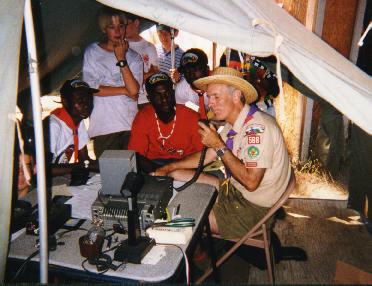 A Patrol looks on intently as Paul tries for a QSO with a ham "with nothing much to
do". Our best contacts were with retired fellows in Arizona, Nevada, Oregon and
neighboring states who had the time (during the week) to talk for 30 or 40 minutes
to a bunch of Scouts with various accents. We found everyone on the bands to be
most hospitable.
A Patrol looks on intently as Paul tries for a QSO with a ham "with nothing much to
do". Our best contacts were with retired fellows in Arizona, Nevada, Oregon and
neighboring states who had the time (during the week) to talk for 30 or 40 minutes
to a bunch of Scouts with various accents. We found everyone on the bands to be
most hospitable.
 Paul had some carefully-scripted phrases typed in big font, to help our new ops
get over the microphone fright. As you can see from the patches on his
sleeve, he's Scoutmaster of
Troop 566 in Saratoga, California, USA.
Paul had some carefully-scripted phrases typed in big font, to help our new ops
get over the microphone fright. As you can see from the patches on his
sleeve, he's Scoutmaster of
Troop 566 in Saratoga, California, USA.
 One of the Scouts looks up from his intense work on the 20-meter station. Though
we had packet and VHF at K6BSA, we were too far "in the backcountry" to hit
the Mount Elizabeth packet or FM repeater stations. HF seemed to be the mode
of choice.
One of the Scouts looks up from his intense work on the 20-meter station. Though
we had packet and VHF at K6BSA, we were too far "in the backcountry" to hit
the Mount Elizabeth packet or FM repeater stations. HF seemed to be the mode
of choice.
 "Who cares whether it's day or night?!" says Al. In the evenings we'd sometimes
get Scouts who'd hear the strange sounds as they wandered by, and stop in for
a chat. Otherwise this was a great time for some CW into Europe on 20m.
"Who cares whether it's day or night?!" says Al. In the evenings we'd sometimes
get Scouts who'd hear the strange sounds as they wandered by, and stop in for
a chat. Otherwise this was a great time for some CW into Europe on 20m.
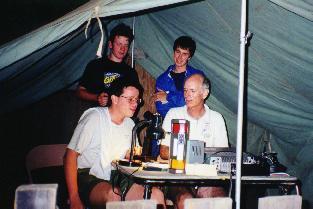 Paul often got some of the camp staff to drop by in the evenings, after the kitchen
chores were done. We'd add another half-dozen lengthy QSOs to the logbook before
turning in for the night.
Paul often got some of the camp staff to drop by in the evenings, after the kitchen
chores were done. We'd add another half-dozen lengthy QSOs to the logbook before
turning in for the night.
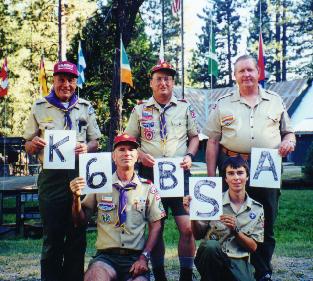 Our tight-knit crew shows off the Troop's club callsign: K6BSA, "The California
Scouting Station". From left to right:
Our tight-knit crew shows off the Troop's club callsign: K6BSA, "The California
Scouting Station". From left to right:
K: Ed Sheldon
6: Paul Wesling
B: Al Rusnak
S: Matt (a camp staffer)
A: Bill Landucci.
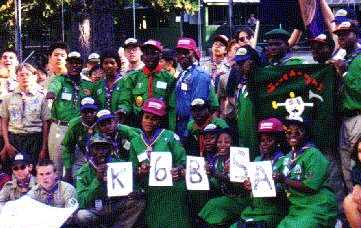 As we prepare for Rendezvous'98's closing ceremony, the Nigerian team publicizes
the K6BSA "operation" and remembers the fun contacts we all made.
As we prepare for Rendezvous'98's closing ceremony, the Nigerian team publicizes
the K6BSA "operation" and remembers the fun contacts we all made.
 With the sun setting in the west, Scouts from many lands gather in the Flag Meadow for the lowering of the
national flags, and make one last salute to Hams around the world. Perhaps we'll
talk again, "down the log!"
With the sun setting in the west, Scouts from many lands gather in the Flag Meadow for the lowering of the
national flags, and make one last salute to Hams around the world. Perhaps we'll
talk again, "down the log!"
![[*]](../gif/mail.gif) [email protected] ||
Last updated: 20 December 1999
[email protected] ||
Last updated: 20 December 1999